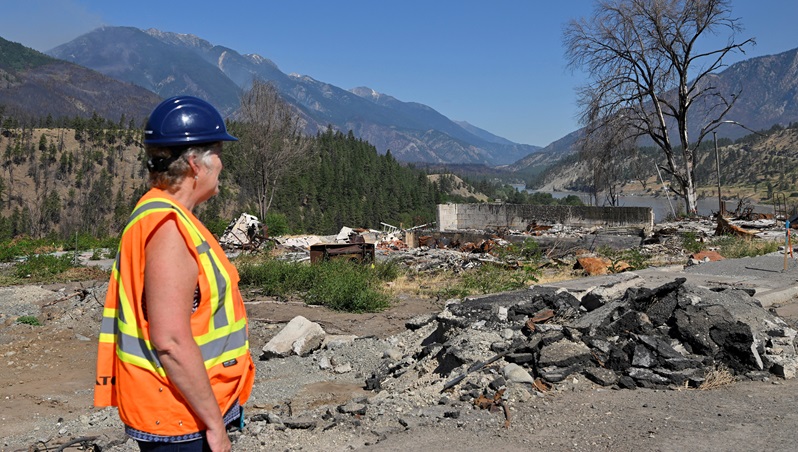The Canadian government has announced a new target to reduce planet-heating emissions 45-50% from 2005 levels by 2035, despite its official advisors on the Net Zero Advisory Board (NZAB) recommending a 50-55% goal and climate campaigners calling for an 80% cut.
The new target is in addition to an existing goal to cut emissions 40-45% by 2030. Canadian Environment Minister Steven Guilbeault said the 2035 target “keeps us on track to keep the promise to our kids and grandkids that the world we leave behind for them will be safe, sustainable, affordable and prosperous”.
But the NZAB, which the government consulted on the new target, said in a statement on Thursday that “the lower range of the government’s target risks Canada’s ability to stay on track for net-zero emissions”. “Our modelling and analysis showed that targets below 50% will put Canada behind on its legislated objective of net-zero emissions by mid-century,” it added.
The NZAB is made up of nine Canadians, including campaigners, a financier, an electrical engineer, an Indigenous community leader and a climate scientist.
The board warned that “postponing action means requiring even deeper decarbonisation efforts in the future, which could bring higher risks and costs”. “We need a national effort to reach, and ideally surpass, a 50% reduction by 2035 while ensuring climate policies are affordable for Canadians,” it said.
All countries that signed up to the 2015 Paris Agreement are supposed to submit a more ambitious national climate plan – known as a Nationally Determined Contribution (NDC) – to the United Nations by late next year. The Canadian government confirmed that its new 2035 target will be part of its NDC, but the full document will not be published until 2025. A concrete implementation plan to meet the target will be drawn up by December 2029, it added.
International comparisons
The NZAB compared Canada’s 2035 target unfavourably with other similarly wealthy nations like the UK, which recently set a target to cut emissions by 81% between 1990 and 2035 “following the recommendation of its climate advisory group, the Climate Change Committee”. The board added that the EU is expected to choose a 2035 target in a similar range and Japan has recently proposed a 60% reduction target, in order to stay on a pathway to net-zero.
EU should push for global deal to curb solar geoengineering, advisors say
NZAB member Catherine Abreu, who is director of the International Climate Politics Hub, noted that Canada’s target envisions at most a 1% a year decrease in emissions between 2030 and 2035, a pace of reduction she called “frankly pathetic” when the US, UK and EU cut their emissions 3%, 5% and 8% respectively in 2023.
She added that the “incredibly disappointing” target will damage Canada’s global credibility as it “sticks out like a sore thumb amidst the targets that other G7 nations are putting forward”. “It’s painful to see a government that has spent most of the last decade working hard to revolutionise Canadian climate policy put out a target that projects those policies will fail to do what they’re designed to,” she said in a statement.
Oil an obstacle
The Canadian government has been led by Justin Trudeau’s centrist Liberal Party since 2015. In 2019, it implemented a national tax on carbon emissions and is now trying to implement a cap on emissions from the country’s large oil and gas production industry. The carbon price started out at C20 (US$16) a tonne and, under the current government’s plans, will ramp up steadily to C$170 ($134) in 2030.
Despite these measures, emissions have yet to consistently decline in Canada as they have in Europe and the US. This is partly because Canada still produces a lot of oil, a sector mostly under the control of provincial governments, and the production of this fossil fuel creates a lot of emissions. In addition, Canada’s transport emissions have continued to rise, as Canadians opt for bigger, more polluting cars like Sports Utility Vehicles (SUVs).
Why rich countries are “reluctant” on additional JETP coal-to-clean deals
In a statement on the new target, the government claimed it had “successfully bent the emissions curve” through efforts like energy efficiency improvements, decarbonising electricity and the carbon tax. When it came to power in 2015, emissions were on course to increase 9% by 2030, it said, but instead they have fallen slightly already. There were over 314,000 jobs in the environmental and clean technology products sector in 2021, up 6.5% from 2020, it added.
Right-wing backlash
Canada’s carbon tax has been highly contentious and opposed by oil-reliant provinces like Alberta, as well as by the right-wing opposition Conservative Party. With federal elections scheduled for October next year, the Conservatives are leading in the polls and are campaigning by putting the slogan “axe the tax” on billboards and T-shirts.
Reacting to the new 2035 emissions target, Caroline Brouillette, executive director of Climate Action Network Canada, said Trudeau had “chosen to cave” to “belligerent climate deniers”.
She pointed to “oil and gas backed-disinformation campaigns and efforts to roll back progress”. “It has been alarming to see, with some rare exceptions, our politicians engage in a race to the bottom – at a moment when we most need leadership to confront the billionaires profiting from burning our world down,” she added.
(Reporting by Joe Lo; editing by Megan Rowling)
